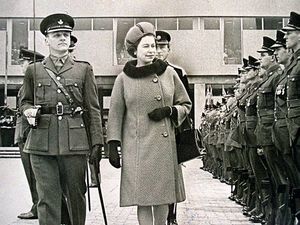Billy Wright – Golden memories of a Wolves legend at 100
He would have turned 100 tomorrow – and yet the lustre of the Billy Wright legend lives on undiminished.
Born in Ironbridge on February 6, 1924, has there ever been a greater player to don the gold shirt of Wolves or, for that matter, the white shirt of England?
He led Wolves through years of glory and illustrious achievement.
He was the first England player to receive 100 caps.
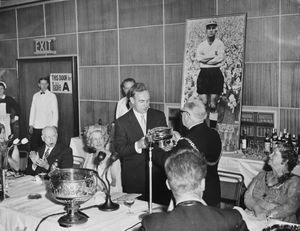
On and off the field he was a dignified ambassador for the game, a gentleman who was an inspiration to players and fans everywhere, who never received a caution or a red card.
And his marriage to singing star Joy Beverley was a foretaste of the fusion of celebrity and sport which is so familiar today.
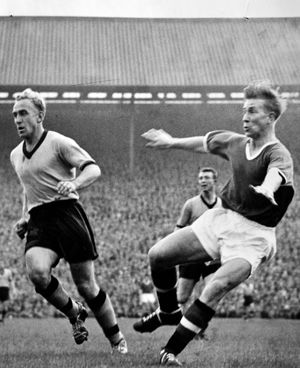
For a small, fair-haired lad, who enjoyed kickabouts on Gorby's Bridge at Madeley Wood, he was to go a long way.
As so often, his talent was in the genes, as his dad Tommy Wright was an able footballer who played in local teams.
"I could see Billy was born to football. He took to it naturally," he was to recall.
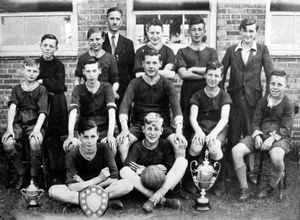
Tommy, who had a job at the Coalbrookdale Works, added: "We often used to play with a tennis ball in the house and broke many a gas mantle.
"Billy would spend hours kicking a ball up against the door. When he was eight we gave him a pair of boots for Christmas, and a ball for his birthday in February.
"The biggest thrill I ever had was when he was playing in the school team, and I saw him on the right wing, score a goal with his left foot."
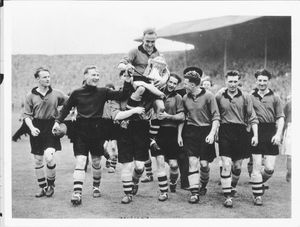
Billy first attended Madeley Wood Methodist School and was outside right in the school football team, and then went on to Madeley Modern School where sports master Norman Simpson said: "I have never seen a boy to touch him at football before or since."
There follows one of those stories which are all part of the Billy Wright legend – his initial rejection by Wolves. And it was nothing to do with the fact that as a youngster Billy was an Arsenal supporter.
At Tommy's request, Mr Simpson got in touch with the club, and Billy, Mr Simpson, and a Mr F Geoffrey, went to see Wolves' manager Frank Buckley. Billy was put through his paces and given a job on the ground staff. But a surprise was in store.
After a few months Major Buckley wrote to say he was returning Billy as it was not thought he had the stature to make the grade as a professional footballer.
"He was going to send Billy back at the end of the week, but I wrote to him and gave him physical details of Billy's ancestors – they were all well developed – and said in my opinion Billy would make the grade.
"I said Billy would develop late and I advised them to keep him, and told them they would miss something if they didn't. After that letter Billy was kept at the Wolves, and he soon made good," said Mr Simpson.
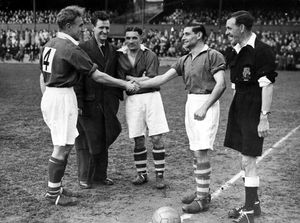
By the narrowest of margins the career of a future giant of the game was saved.
It was a change of heart by the Wanderers which was to pay dividends. Billy would go on to lead Wolves to three league titles and victory in the FA Cup, making 541 appearances for the club and scoring 19 goals.
He signed for Wolves when he was 17 and continued to play the odd game despite joining the army as a physical training instructor in 1943. But it was after the war that Billy's star really began to rise. When Stan Cullis retired and became manager, it was Wright who took up the captain's armband.
Throughout the 1950s he was the powerhouse of the team. In nine seasons, Billy missed only 31 games and several were because of his international call ups. He was the 1952 Footballer of the Year.
He played for his country 105 times, wearing the captain’s armband on 90 occasions.
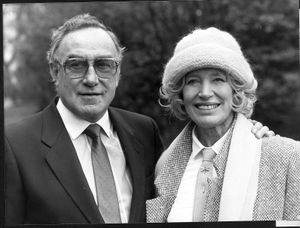
In 1958 Billy married singer Joy Beverley of The Beverley Sisters.
All good things come to an end, and he played his last game for Wolves against Leicester in 1959, with Wolves winning 3-0, and last graced the Molineux turf in a practice match in August that year, being clapped onto the pitch by a players' guard of honour in front of a crowd of nearly 20,000.
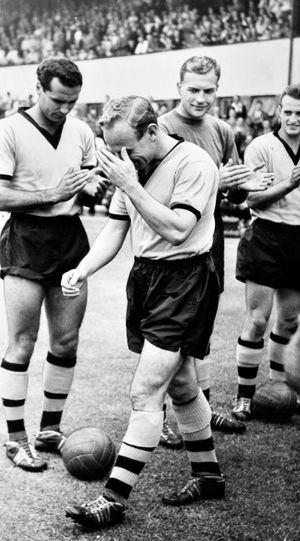
In recognition of his services to football, he was awarded a CBE.
He became manager of his boyhood heroes Arsenal in 1962 where he spent four years with limited success, before becoming head of sport for ATV.
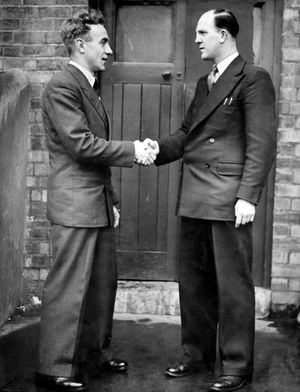
In May 1990 Billy delighted Wolves fans and returned to Molineux as a director for the board, one of the most popular homecomings of all time.
But Wolverhampton wept in September 1994 when, aged 70, he died following a fight with stomach cancer.
At his funeral the whole city mourned his passing, fans having covered the streets around Molineux with flowers and tributes.
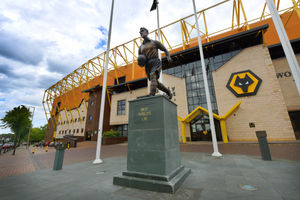
On the second anniversary of his death, a statue of Billy was unveiled outside the stadium in his memory, passed every week during the football seasons by thousands of home fans.
There were many tributes, but Billy's qualities had been evident from the outset, and the words of a school report could have applied throughout his life: "Work good. Character excellent. A fine type. Is head boy. Dependable. Continues to dignify the position of Captain of the school."


